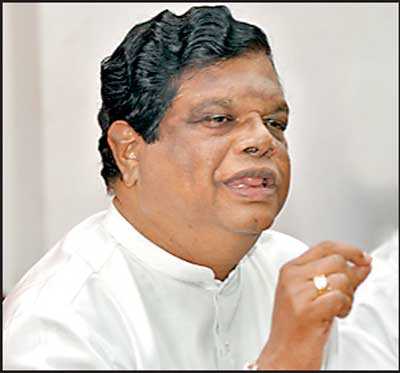Thursday Apr 25, 2024
Thursday Apr 25, 2024
Wednesday, 12 December 2018 00:00 - - {{hitsCtrl.values.hits}}
By Nuwan Senarathna
MP Bandula Gunawardana yesterday said he is unlikely to be able to amend the Sri Lanka-Singapore Free Trade Agreement (FTA) by January, due to the Court of Appeal’s interim order restraining the Cabinet appointed by President Maithripala Sirisena.
 |
MP Bandula Gunawardana |
Gunawardana was one of the fiercest critics of the FTA, which was signed in January 2018. Under the agreement, the FTA can only be modified through the agreement of both sides before 21 January 2019.
“As Minister of International Trade and Investment of the Sirisena-Rajapaksa Cabinet, I had prepared a Cabinet paper requesting to postpone the deadline for amendments of the SLSFTA, but due to the interim Order issued by the Court of Appeal, I am unable to do anything. My hands are tied,” MP Gunawardana told reporters at the Western Province Aesthetic Resort (NADA).
He argued the deadline for making amendments to the FTA, which is 21 January, needs to be postponed to renegotiate the initial agreement to prevent harmful effects of SLSFTA. Amendments to the FTA cannot be made after a year has lapsed.
Gunawardana claimed the expert committee appointed by President Maithripala Sirisena to look into SLSFTA had stated that the agreement could cause negative impacts for the country, but conceded that he has not read the full report, and did not give details as to what the exact repercussions would be.
“President Maithripala Sirisena said that he will give a copy of the report once he has studied the report within this week. Once I get my copy, I will reveal more facts to the media,” he added.
Gunawardana admitted bilateral trade agreements cannot be revoked based on individual opinions, but insisted it would still continue discussions with stakeholders, including officials of the Commerce Department, to find a way forward. Gunawardana acknowledged that the FTA cannot be changed unilaterally by Sri Lanka, and that any attempt to do so, or pull out of the agreement, would be detrimental to the international reputation of the country.
“I learnt that the Department of Commerce should have been involved in the initial negotiations of the agreement. Instead of consulting the Department of Commerce, MP Ranil Wickeremesinghe and MP Malik Samarawickrama had appointed their loyalists to negotiate the agreement, and signed SLSFTA without wider consultation,” he charged. He also claimed that despite raising concerns of the FTA repeatedly, they were ignored by the Government that existed before 26 October.
Gunawardana also charged that Sinhala and Tamil translations of the SLSFTA were not available at the time he was appointed as Minister of International Trade and Investment by President Maithripala Sirisena. He noted he was unable to finalise translations due to the Court of Appeal interim Order.
The report of the Experts’ Committee appointed to look into the FTA was presented to President Maithripala Sirisena on Monday at the Presidential Secretariat. The President’s Media Unit, releasing a short statement, said President Sirisena had said the report highlighted the agreement had been rushed without the proper consent of stakeholders. The President expressed these views after he received the report of the Experts Committee at the Presidential Secretariat from the Committee Chairman, Prof. W.D. Luxman.
MP Anura Priyadarshana Yapa, speaking in his turn, said if the Appropriation Bill or Vote on Account was unable to be passed prior to 31 December, there are still legal provisions that could be used to raise loans and fund recurrent expenditure.
Yapa explained that under the Loans (Special Provisions) Act No 40 of 1982, it is possible for the President to access funds amounting to a quarter of the loans that were borrowed under the previous financial year. He argued that these could be used to repay any outstanding loans or be used for public finance needs, until the Constitutional deadlock is resolved. However, he said no previous leader or Government had ever resorted to this Act to obtain funds, and this was an unprecedented move.
“This legislation can be used to raise funds and pay for recurrent expenditure,” he said.